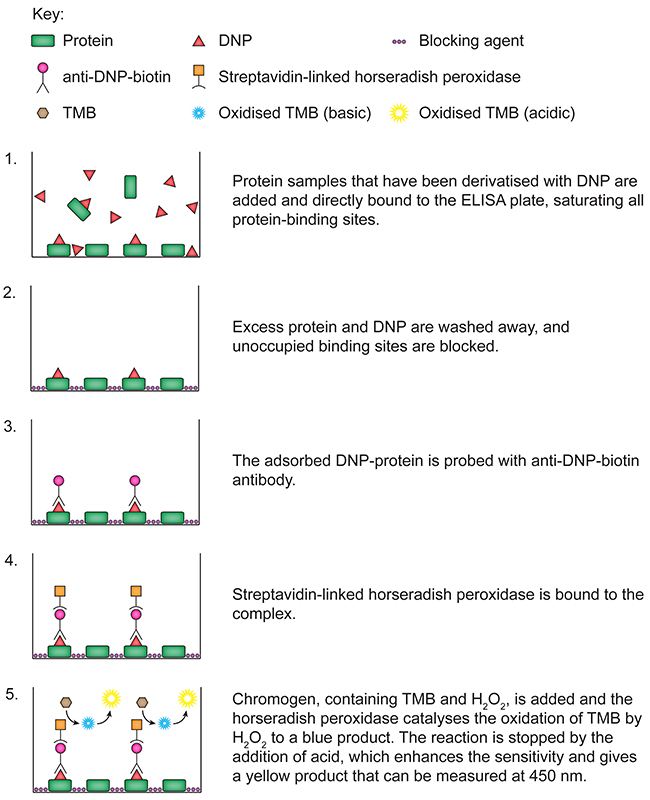Mātai Hāora - Centre for Redox Biology and Medicine can measure biomarkers of oxidative stress in various biological specimens. This can be done on a contract basis for external users. Please contact us for detailed quotes.
Protein Carbonyl Assay
Proteins are major targets for reactive oxygen species produced during oxidative stress due to their high abundance and critical functional roles in biological systems. This results in a wide range of protein oxidation products, including protein carbonyls, which can lead to the inhibition of enzymatic activity, as well as aggregation, crosslinking and fragmentation.
The accumulation of oxidised proteins is associated with ageing and a range of diseases including cancer, inflammation and neurodegeneration. While reactive oxygen species are difficult to measure directly, protein carbonyls are chemically stable and serve as excellent biomarkers for oxidative stress and protein oxidation for a wide range of ROS.
Our Protein Carbonyl Assay, developed over 20 years ago, is an enzyme-linked immunosorbent assay (ELISA) based on the reaction of protein carbonyls with dinitrophenylhydrazine (DNP) and detection with an antibody against DNP.
The assay provides a convenient method for quantifying protein carbonyls levels, and only requires microgram amounts of proteins. It is highly sensitive and has very low non-specific background.
The Protein Carbonyl Assay is suitable for any sample containing soluble protein. Biological samples that have been used include plasma, serum, urine, cell culture supernatant, cell extracts, tissue homogenates, bacterial and plant extracts, and pure protein.

Contact for more information
Please contact Dr Nick Magon if you have any queries regarding analyses,.
Purchase the Protein Carbonyl Assay kit
The assay can be purchased in kit form from our partners, BioCell Corporation.
Publications using the Protein Carbonyl Assay
References
- Protein carbonyl measurement by a sensitive ELISA method. Buss, H., Chan, T. P., Sluis, K. B., Domigan, N. M., & Winterbourn, C. C. (1997). Free Radic Biol Med, 23(3), 361-366.
- Protein carbonyl measurement by ELISA. Buss, I. H., & Winterbourn, C. C. (2002). Methods Mol Biol, 186, 123-128.
- Protein carbonyl groups as biomarkers of oxidative stress. Dalle-Donne, I., Rossi, R., Giustarini, D., Milzani, A., & Colombo, R. (2003). Clin Chim Acta, 329(1-2), 23-38.
- Determination of protein carbonyls in plasma, cell extracts, tissue homogenates, isolated proteins: Focus on sample preparation and derivatization conditions. Weber, D., Davies, M. J., & Grune, T. (2015). Redox Biol, 5, 367-380.
- Protein carbonyl measurement by enzyme-linked immunosorbent assay. Winterbourn, C. C., & Buss, I. H. (1999). Methods Enzymol, 300, 106-111.